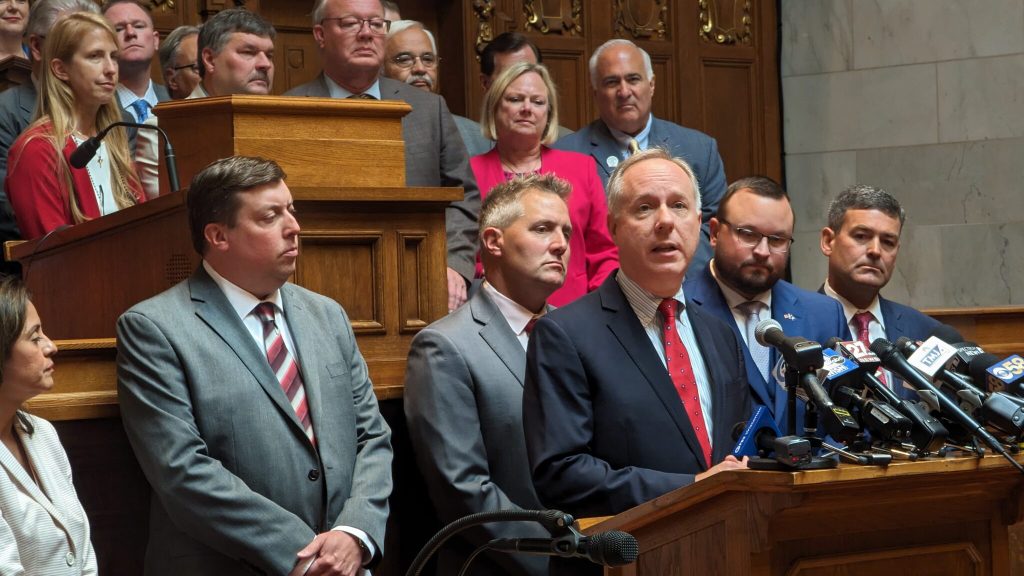Republicans Outraged By Evers’ Vetoes
Blasting 'trickery' of 'radical governor,' they vow to 'stand up and fight.'

Assembly Speaker Robin Vos (R-Rochester) answered questions at a press conference ahead of Assembly Republicans passing the budget bill on June 29, 2023. (Baylor Spears | Wisconsin Examiner)
Assembly Speaker Robin Vos (R-Rochester) vowed that Republicans would “stand up and fight” against Gov. Tony Evers’ partial vetoes of the state budget, saying they were “trickery” and that he would look at trying to assemble the two-thirds majority needed to override Evers’ vetoes and pursue additional tax cuts.
The comments by Vos come as Republican lawmakers continue to react to Evers’ signing of the biennial budget — not with celebrations for the Democratic governor approving a budget written and passed by Republicans — but with a flurry of complaints about how Evers changed the budget using his broad veto power.
Evers signed the budget on Wednesday, but not before gutting GOP lawmakers’ $3.5 billion income tax cut plan and extending an annual $325 increase in school revenue limits for over four centuries.
Republicans mourn gutted tax cuts
Republicans expressed outrage that Evers did not approve tax cuts for Wisconsin’s top two tax brackets.
“With his veto message today Governor Evers said, ‘F*** the taxpayers, they don’t know a G**d*** thing about spending their own money.’ These vetoes aren’t the work of a rational governor,” Sen. Van Wanggard (R-Racine) said in a written statement. “They are the conscious decisions of a radical governor.”
Evers vetoed parts of the Republican plan that would have condensed the state’s progressive tax structure to three brackets from four. The vetoes eliminate the top two income tax cuts passed by Republicans, which would have reduced the top bracket from 7.65% to 6.50% and the third tax bracket from 5.30% to 4.40%. By eliminating those tax cuts, the state’s general fund tax revenue will increase an estimated $2.6 billion over the biennium.
Sen. Patrick Testin (R-Stevens Point) posted a graph on Twitter highlighting that only 5% of Republicans’ original tax cut proposal remained after Evers’ vetoes.
“Last year Governor Evers campaigned on Republican tax cuts; now that he’s been re-elected, he shows his true colors. The Governor’s partial veto of the legislature’s tax cut hurts taxpayers, hinders Wisconsin’s ability to attract new talent, and stifles our potential for growth,” Testin tweeted.
Republicans focused on Evers cutting the tax cut for the third bracket — single filers making between $25,520 and $280,950 and joint filers making between $34,030 and $374,600 — saying that Evers broke his campaign promise by not delivering tax cuts to the middle class.
“Governor Evers’ action on the budget nearly eliminates critical income tax cuts for middle-class families while simultaneously increasing property taxes on hard-working Wisconsinites for the next four hundred years,” Rep. Mark Born (R-Beaver Dam) said in a statement.
Britt Cudabeck, Evers’ spokesperson, pushed back on claims that Evers did not want to give tax cuts to the middle class, pointing to his original tax cut proposal.
“Actually, @GovEvers proposed a 10% middle-class tax plan to provide $1.2 billion in tax relief for working families, seniors, caregivers, parents, and veterans, among others,” Cudabeck said in response to one of Wanggard’s tweets. “You rejected it to give 11 filers who make $75 million+ an average $1.8 million tax cut per year instead.”
Evers said that his vetoes would ensure there were ample resources available if the Legislature decides to come back to complete work on the budget. Republicans reacted to that by saying they would not spend any additional money.
Vos told conservative talk show host Jay Weber that Republicans will look to cut taxes in other areas after Evers vetoed the majority of their $3.5 billion in proposed income tax cuts. The remaining cuts totaled about $175 million.
“We are going to keep putting this back into tax relief. We are not going to grow the size of government,” Vos said. “We are going to try to make sure that it goes back into the pockets of hardworking taxpayers through their income tax cuts, property tax cuts, whatever tax cut we can pass,”
Evers told the Journal Sentinel on Thursday that he wouldn’t support new legislation that would address the third tax bracket. “(If) their concern now is that there isn’t a big enough tax cut for the middle class, all they had to do was adopt mine to begin with,” Evers said.
Lawmakers criticize school revenue limit increases
Evers introduced another change to the budget, saying in his veto message he was able to “provide school districts with predictable long-term increases for the foreseeable future.” By that, Evers meant that he eliminated a “20” and a dash from a provision that raised school revenue limits in 2023-24 and 2024-25 school years. The resulting language will give schools an additional $325 per pupil, per year in spending authority until 2425.
Republicans claimed that Evers broke the deal he had with them on school funding and, worse, solidified property tax increases for the next several centuries.
“Nothing screams ‘Freedom’ quite like one citizen, single-handedly, choosing to exorbitantly raise taxes on you, your children, your grandchildren, your great grandchildren, your great great grandchildren, your great great great grandchildren, your great great great great….,” Rep. Alex Dallman (R-Green Lake) tweeted.
The $325 per pupil revenue limit Evers extended for centuries represents a cap on any increase in the amount districts are allowed to spend, including state aid and local property taxes, which averages about $12,000 per student statewide. The amount that is paid by property taxes is calculated by taking the revenue limit — how much one district is allowed to spend — minus the amount of state aid, which varies by school depending on factors including property values.
Despite Republican claims, Executive director of Wisconsin Public Education Network Heather DuBois Bourenane said school districts wouldn’t automatically be looking to increase property taxes the max amount every year.
“Districts will have the option of increasing their levies by that amount, [$325 per pupil, per year] but just because that’s what your spending limit is doesn’t mean that that’s how much you’re going to spend,” DuBois Bourenane said.
She said the action by Evers actually brings current policy a step closer to the way school revenue limits originally worked.
“It is a huge and welcome relief to see the state finally restore regular, predictable increases to spending limits for districts, something that was common standard practice under Gov. [Tommy] Thompson, and was always part of what was supposed to be just the way revenue limits work,” DuBois Bourenane. “The state tells you how much you’re allowed to spend, but you can at least have an inflationary increase to your spending limit every year.”
DuBois Bourenane said school revenue limits were adopted under Republican Gov. Tommy Thompson as a part of a package of different policies meant to ensure schools had enough resources but also weren’t over-taxing locally or spending beyond their means. She said at that time, school districts would receive annual inflationary increases in their spending authority.
She added that in the past when schools were receiving regular inflationary increases, it was an “unusual” practice for most school districts to levy the maximum amount because they didn’t need to.
“You have to have a pretty jaded view of our educators and how our duly elected school board members, how seriously they take their responsibilities to local taxpayers and local kids, to think that they just want to waste this money. They absolutely do not,” DuBois Bourenane said. “What our schools want is adequate and predictable resources, and the state has not been providing that for years, or decades, really.”
Due to freezes in school spending over many years, Wisconsin school funding has not kept up with inflation, which has led many districts to go to referendum to fund schools. Dubois Bourenane said that an inflationary increase this year to address years of stagnancy would have been $1,510 per pupil per year — not $325 — and that costs are not going to get cheaper for schools.
“We don’t know for a fact that inflation is always going to be as high as it is right now. But, trends show educating kids does not get cheaper over time. Things get more and more expensive,” DuBois Bourenane said. “None of this is free.”
Not totally ‘unprecedented’
Vos said on Thursday that he was “disappointed with Tony Evers really overstepping his authority and clearly breaking his campaign pledges” and added that his partial vetoes are “unprecedented.”
The partial veto power in Wisconsin is one of the most powerful in the country, and Evers’ vetoes are not out of line with those issued by Wisconsin governors in the past.
Former Republican Gov. Scott Walker issued a veto in the 2017 budget that’s known as the “thousand-year veto” to delay the start of a program from Dec. 31, 2018 to December 3018. The veto was challenged in the courts in 2020, but the Wisconsin State Supreme Court decided not to take the case.
Former Republican Gov. Tommy Thompson holds the record for most vetoes issued on one budget with 457 partial vetoes in the 1991 budget. During that time, Thompson frequently used the so-called “Vanna White” veto, which allowed him to create new words by vetoing individual letters. The “Frankenstein” veto, which allowed a governor to create a new sentence by combining parts of two or more sentences, was at one point used by former Gov. Jim Doyle to piece together 20 words within 752 words to redirect significant funding to Wisconsin schools.
Both of these actions have since been prohibited through amendments to the state Constitution.
Republicans, beyond passing additional legislation, are poised to try to find other ways of responding to Evers’ vetoes. Vos said on Thursday that the Legislature would look at overriding Evers’ vetoes, but acknowledged that that would be difficult since Republicans hold a two-thirds majority in the Senate but not the Assembly.
Vos said a court case was a possibility, but was skeptical of how that would turn out since the Wisconsin Supreme Court’s makeup will be changing in about a month. Judge Janet Protasiewicz will take her seat on the bench in August, flipping control from the current conservative majority to a liberal majority on the court.
Three of Evers’ partial vetoes on the last budget were overturned in 2020 by the Wisconsin Supreme Court, although the justices didn’t come to a single legal rationale for when a governor has overstepped his power.
“If we had a fair Supreme Court, perhaps someone could take it there and have it overridden like it was a couple years ago under the previous court, but only time will tell,” Vos said. “[Evers] clearly has gone outside the norm, he did something that was very unprecedented and it is just another example of why it seems like he can’t be trusted.”
Evers issued a total of 51 vetoes. The other changes include:
- Reducing a $10 million grant to Visit Milwaukee to $1 million with the remaining $9 million being retained for general marketing purposes. The money was meant to help support the Republican National Convention, which will be hosted in Milwaukee in August 2024. Evers said in his veto message that he objected to the level of funding for Visit Milwaukee when the Legislature failed to provide adequate funding for other priorities including child care and higher education
- Cutting a $1 million grant to the city of Burlington for restoration of a dam on Echo Lake, which is located in Assembly Speaker Robin Vos’ district. Evers said he objected to providing additional state aid since the project already received a $1 million grant under the Municipal Dam Grant Program during the 2021-23 grant period.
- Eliminating a requirement that provided funding to the Wisconsin Housing and Economic Development Authority (WHEDA) be used to specifically create revolving loans for homeowners doing rehabilitation or renovation projects. With the veto, WHEDA would have more flexibility to create a grant or forgivable grant program, rather than just a revolving loan program.
- Keeping money for local governments allocated for that purpose. Evers vetoed three provisions related to sending unspent local government funds back into the state’s general fund at the end of the fiscal year. One provision would have sent unspent money from the innovation grant and innovation planning grant fund, which was created as a part of a bipartisan deal by Evers and Republican lawmakers, back into the general fund. Evers said that he objected to depriving the local government fund of money that could be used in the future to extend the programs or increase other aid to local governments. Another provision that Evers vetoed would have sent unused money designated for administering an additional 2% sales tax for Milwaukee back to the state.
- Cutting $3.3 million meant to assist the University of Wisconsin-Milwaukee at Washington County campus transition from the UW System to operating under the Washington County and the Moraine Park Technical College district board. Evers said he objected to the Legislature “singling out” one of the state’s branch campuses when many other campuses are facing challenges due to the Legislature’s failure to provide adequate funding to the UW System.
- Eliminating grants totaling $750,000 for the Lakeland STAR Academy — a charter school in Minocqua. Evers said he objected to providing grants to specific schools when the Legislature has failed to provide state money in other school related areas like special education, school nutrition and mental health. He also said it is unfair and inequitable to provide a grant to one school when there are hundreds of charter schools authorized in the state.
Republicans fuming after Evers’ vetoes: vow to ‘stand up and fight’ was originally published by Wisconsin Examiner.



















Thanks Evers for making the most out of this GOP-destroyed budget.
Too bad we now have a fair Supreme Court, Republicans can no longer use it to legislate when they don’t get their way. The fact is, the vetoes Evers made better meet the needs and priorities of the people of Wisconsin not just the uber wealthy.
Vos and company are mad because the distain in which they hold the Governor and the people of Wisconsin has come back to bite them.
Hopefully evers has a plan to pay for all of this reckless spending. I used to live in chicago before i moved back up here. They started doing massive spending schemes like this and telling taxpayers that this would improve tye schools. Now the schools down there are some of the highest funded in the nation and student outcomes and test scores are some of the worst. Money does not improve student performance.
Yeah Ryan, it’s paid with something called taxes. You know, the thing GOP wants to slash to zero. Easily could’ve been on that route had it not been veto’d. Simple math.
Salty-assed tears by pin-headed MAGAbots who’’ve been busy tearing this state apart.
GOP outrage just makes me smile. obviously, they have forgotten all of their ‘radical’ actions. go evers.
Isn’t it ironic? When the shoe is on the other foot Republicans squeal about how unfair their past precedent setting behavior really was. Thanks for providing the historical perspective necessary to point out the usual Republican hypocrisy.
Once again we are treated to the spectacle of republicans clutching their pearls and heading for the nearest fainting couch……
for reasons that blah, blah, blah, democrats.
Would be hilarious if they weren’t trying to destroy WI.